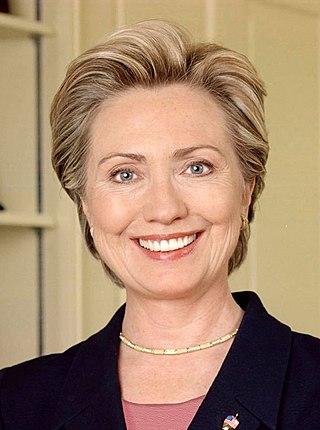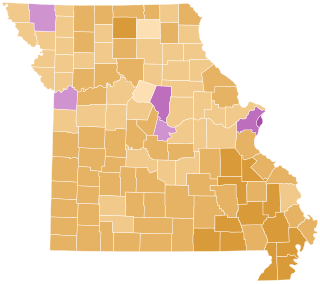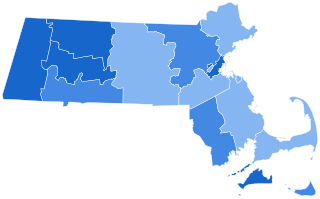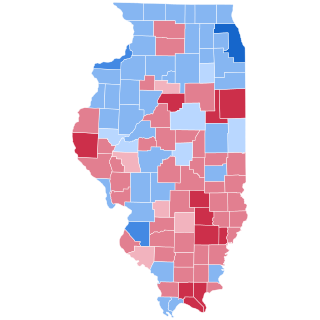
From January 3 to June 3, 2008, voters of the Democratic Party chose their nominee for president in the 2008 United States presidential election. Senator Barack Obama of Illinois was selected as the nominee, becoming the first African American to secure the presidential nomination of any major political party in the United States. However, due to a close race between Obama and Senator Hillary Clinton of New York, the contest remained competitive for longer than expected; neither candidate received enough pledged delegates from state primaries and caucuses to achieve a majority, without endorsements from unpledged delegates (superdelegates).

The 2008 Iowa Democratic presidential caucus occurred on January 3, and was the state caucuses of the Iowa Democratic Party. It was the first election for the Democrats of the 2008 presidential election. Also referred to as "the First in the Nation Caucus," it was the first election of the primary season on both the Democratic and Republican sides. Of the eight major Democratic presidential candidates, then-U.S. Senator Barack Obama of Illinois received the most votes and was ultimately declared the winner of the Iowa Democratic Caucus of 2008, making him the first African American to win the caucus and the first African American to win a primary state since Jesse Jackson in 1988. Former U.S. Senator John Edwards of North Carolina came in second place and then-U.S. Senator Hillary Clinton of New York finished third, though Clinton received more delegates than Edwards. Campaigning had begun as early as two years before the event.

The 2008 United States presidential election in Iowa took place on November 4, 2008, as part of the 2008 United States presidential election. Voters chose seven representatives, or electors to the Electoral College, who voted for president and vice president.

The 2008 New Hampshire Democratic presidential primary on January 8, 2008 was the first primary in the United States in 2008. Its purpose was to determine the number of delegates from New Hampshire that would represent a certain candidate at the National Convention. In a primary, members of a political party—in this case, the Democratic Party—will select the candidates to a subsequent election. Since 1920, New Hampshire has always hosted the first primaries in the entire nation. The Democratic Party's primary occurred on the same day as the Republican primary.

The 2008 Nevada Democratic presidential caucuses took place on January 19, 2008 after having been moved from a later date by the Nevada Democratic Party. The Nevada Democratic Caucus was considered important in determining the eventual party nominee, as many described it as the "Bellwether of the West" seeing as how it is the first Western state to vote in the Democratic Presidential Primary season.

The 2008 Minnesota Democratic presidential caucuses took place on Super Tuesday, February 5, 2008 with 78 delegates at stake. The winner in each of Minnesota's eight congressional districts was awarded all of that district's delegates, totaling 47. Another 25 delegates were awarded to the statewide winner, Barack Obama. The 72 delegates represented Minnesota at the Democratic National Convention in Denver, Colorado. Sixteen other unpledged delegates, known as superdelegates, also attended the convention and cast their votes as well.

The 2008 Delaware Democratic presidential primary was held on Super Tuesday, February 5, 2008, and had a total of 15 delegates at stake. The winner in each of Delaware's subdivisions was awarded those subdivisions' delegates, totaling 10. Another five delegates were awarded to the statewide winner, Barack Obama. The 15 delegates represented Delaware at the Democratic National Convention in Denver, Colorado. Eight other unpledged delegates, known as superdelegates, also attended the convention and cast their votes as well.

The 2008 Georgia Democratic presidential primary took place on Super Tuesday, February 5, 2008, and had a total of 87 delegates at stake. The winner in each of Georgia's 13 congressional districts was awarded all of that district's delegates, totaling 57. Another 30 delegates were awarded to the statewide winner, Barack Obama. The 87 delegates represented Georgia at the Democratic National Convention in Denver, Colorado. Sixteen other unpledged delegates, known as superdelegates, also attended the convention and cast their votes as well.

The 2008 Massachusetts Democratic presidential primary was held on Super Tuesday, February 5, 2008, and had a total of 93 delegates at stake. The winner in each of Massachusetts's 10 congressional districts was awarded all of that district's delegates, totaling 61. Another 32 delegates were awarded to the statewide winner, Hillary Clinton. The 93 delegates represented Massachusetts at the Democratic National Convention in Denver, Colorado. Twenty-six other unpledged delegates, known as superdelegates, also attended the convention and cast their votes as well. Hillary Clinton won despite Obama receiving endorsements from both senators, Ted Kennedy and John Kerry, and the Governor Deval Patrick.

The 2008 Missouri Democratic presidential primary took place on Super Tuesday, February 5, 2008, with 72 delegates at stake. The winner in each of Missouri's nine congressional districts was awarded all of that district's delegates, which totaled 47. Another 25 delegates were awarded to the statewide winner, Barack Obama. The 72 delegates represented Missouri at the Democratic National Convention in Denver, Colorado. Sixteen other unpledged delegates, known as superdelegates, also attended the convention and cast their votes as well.

The 2008 Connecticut Democratic presidential primary took place on Super Tuesday, February 5, 2008, with 48 delegates at stake. The winner in each of Connecticut's five congressional districts was awarded all of that district's delegates, totaling 31. Another 17 delegates were awarded to the statewide winner, Barack Obama. The 48 delegates represented Connecticut at the Democratic National Convention in Denver, Colorado. Twelve other unpledged delegates, known as superdelegates, also attended the convention and cast their votes as well.

The 2008 Louisiana Democratic presidential primary took place on February 9, 2008, and had 56 delegates at stake. The winner in each of Louisiana's seven congressional districts was awarded all of that district's delegates, totaling 37. Another 29 delegates were awarded to the statewide winner, Barack Obama. The 56 delegates represented Louisiana at the Democratic National Convention in Denver, Colorado. Ten other unpledged delegates, known as superdelegates, also attended the convention and cast their votes as well.

The 2008 Maryland Democratic presidential primary took place on February 12, 2008. Nicknamed the "Potomac Primary" or the "Chesapeake Primary" because the District of Columbia and Virginia also held their primaries that day, a total of 70 delegates were up for grabs in Maryland. The winner in each of Maryland's eight congressional districts was awarded all of that district's delegates, totaling 46. Another 24 delegates were awarded to the statewide winner, Barack Obama. The 70 delegates represented Maryland at the Democratic National Convention in Denver, Colorado. Twenty-nine other unpledged delegates, known as superdelegates, also attended the convention and cast their votes as well.

The 2008 Mississippi Democratic presidential primary took place on March 11, 2008, with 33 delegates at stake. The winner in each of Mississippi's four congressional districts was awarded all of that district's delegates, totaling 22. Another 11 delegates were awarded to the statewide winner, Barack Obama. The 33 delegates represented Mississippi at the Democratic National Convention in Denver, Colorado. Seven other unpledged delegates, known as superdelegates, also attended the convention and cast their votes as well.

The 2008 Kentucky Democratic presidential primary took place May 20, 2008, and had 51 delegates at stake. The winner in each of Kentucky's six congressional districts was awarded all of that district's delegates, totaling 34. Another 17 delegates were awarded to the statewide winner, Hillary Clinton. The 51 delegates represented Kentucky at the Democratic National Convention in Denver, Colorado. Nine other unpledged delegates, known as superdelegates, also attended the convention and cast their votes as well.

The 2008 United States presidential election in Massachusetts took place, as in all 50 states and D.C., as part of the 2008 United States presidential election of November 4, 2008. Voters chose 12 representatives, or electors to the Electoral College, who, in turn, voted for the office of president and vice president.

The 2008 United States presidential election in Illinois took place on November 4, 2008, and was part of the 2008 United States presidential election. Voters chose 21 representatives, or electors to the Electoral College, who voted for president and vice president.

The 2008 United States presidential election in Delaware took place on November 4, 2008, and was part of the 2008 United States presidential election. Voters chose three representatives, or electors to the Electoral College, who voted for president and vice president.

The 2008 United States presidential election in New Hampshire took place on November 4, 2008, as part of the 2008 United States presidential election throughout all 50 states and D.C. Voters chose four representatives, or electors to the Electoral College, who voted for president and vice president.

The 2016 United States presidential election in Oregon was held on Tuesday, November 8, 2016, as part of the 2016 United States presidential election in which all 50 states plus the District of Columbia participated. Oregon voters chose electors to represent them in the Electoral College via a popular vote, pitting the Republican Party's nominee, businessman Donald Trump, and running mate Indiana Governor Mike Pence against Democratic Party nominee, former Secretary of State Hillary Clinton, and her running mate Virginia Senator Tim Kaine. Oregon has seven electoral votes in the Electoral College.















